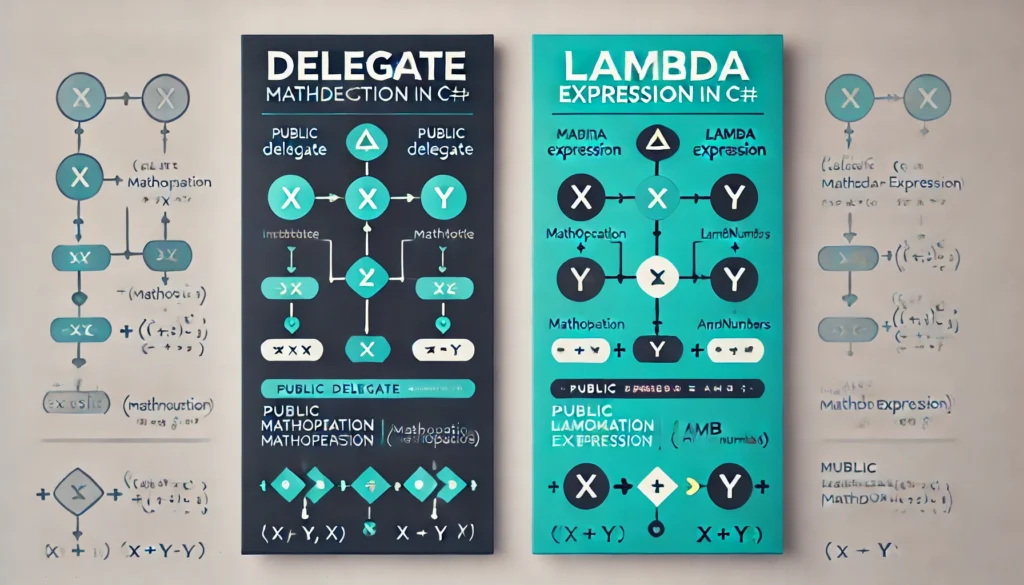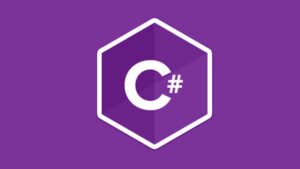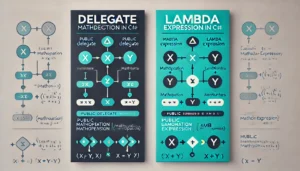In C#, delegates and lambda expressions are both used to define methods or code blocks that can be passed around and invoked dynamically. However, they differ in syntax, purpose, and usage scenarios. Here’s a detailed comparison, along with examples, when to use each, and how they work.
1. What is a Delegate?
A delegate is a type-safe function pointer. It represents a reference to a method with a specific signature and return type, allowing methods to be passed as arguments or stored in variables.
Features of Delegates:
- Can point to methods and invoke them dynamically.
- Used for event handling (e.g., button clicks in UI programming).
- Supports multicast invocation (i.e., multiple methods can be invoked sequentially).
- Ensures type safety—only methods with a matching signature can be assigned.
Example of a Delegate:
// Declare a delegate that takes two integers and returns an integer.
public delegate int MathOperation(int a, int b);
public class Calculator
{
// Define methods matching the delegate's signature.
public int Add(int a, int b) => a + b;
public int Subtract(int a, int b) => a - b;
}
class Program
{
static void Main()
{
Calculator calc = new Calculator();
// Create a delegate instance pointing to the 'Add' method.
MathOperation operation = calc.Add;
Console.WriteLine(operation(5, 3)); // Output: 8
// Reassign delegate to point to the 'Subtract' method.
operation = calc.Subtract;
Console.WriteLine(operation(5, 3)); // Output: 2
}
}When to Use Delegates:
- Event-driven programming, where a delegate is invoked in response to an event (e.g., UI events, button clicks).
- Multicast scenarios, where multiple methods need to be invoked in a sequence.
- When passing methods as parameters to other methods (e.g., a callback function).
When Not to Use Delegates:
- If the inline code block is short and doesn’t need to be reused, lambda expressions or anonymous methods are often preferred.
- If you’re working with asynchronous code, consider Tasks or async/await patterns instead.
2. What is a Lambda Expression?
A lambda expression is an inline anonymous function that can be used to create delegates or expression trees. It’s a concise way to write functions and is often used in LINQ queries or functional programming.
Features of Lambda Expressions:
- Short, inline syntax for defining anonymous functions.
- Can be assigned to a delegate or used directly as a function.
- Powerful in LINQ for filtering, projecting, and transforming data.
- Closures: Captures variables from the enclosing scope.
Example of a Lambda Expression:
// Lambda expression assigned to a delegate.
Func<int, int, int> add = (a, b) => a + b;
Console.WriteLine(add(5, 3)); // Output: 8
// Lambda expression used inline in a LINQ query.
int[] numbers = { 1, 2, 3, 4, 5 };
var evenNumbers = numbers.Where(n => n % 2 == 0).ToList();
foreach (var num in evenNumbers)
Console.WriteLine(num); // Output: 2 4When to Use Lambda Expressions:
- In LINQ queries for filtering, transforming, or projecting data.
- When passing short functions as parameters (e.g., callbacks).
- When you need to quickly define an inline function without reusability.
When Not to Use Lambda Expressions:
- Avoid using lambda expressions if the logic is too complex—prefer defining a named method for clarity.
- If you need to reuse the function in multiple places, consider named methods or delegates.
Difference between Delegates and Lambda Expressions
| Aspect | Delegate | Lambda Expression |
|---|---|---|
| Definition | Type-safe reference to a method | Inline anonymous function |
| Syntax | Requires a delegate declaration | Short and concise syntax (e.g., (a, b) => a + b) |
| Usage | For passing methods, event handling, and callbacks | In LINQ queries, inline callbacks, functional programming |
| Reusability | Points to named methods, reusable | Inline function, usually not reusable |
| Event Handling | Commonly used for event handlers | Rarely used for event handlers |
| Complexity | Can be more verbose | Ideal for short, simple operations |
How Delegates and Lambda Expressions Work Together
In C#, lambda expressions are often used to assign inline functions to delegate types or Func/Action delegates.
Example: Lambda Expression with Delegate:
public delegate int MathOperation(int a, int b);
class Program
{
static void Main()
{
// Assign a lambda expression to a delegate.
MathOperation operation = (a, b) => a * b;
Console.WriteLine(operation(4, 5)); // Output: 20
}
}Here, a lambda expression (a, b) => a * b is assigned to a delegate of type MathOperation.
Built-in Delegates (Func, Action, Predicate)
Instead of declaring custom delegates, built-in delegates are often used with lambda expressions:
Func: Represents a function that returns a value.
Func<int, int, int> add = (a, b) => a + b;
Console.WriteLine(add(2, 3)); // Output: 5Action: Represents a function that returns no value.
Action<string> print = message => Console.WriteLine(message);
print("Hello!"); // Output: Hello!Predicate: Represents a function that returns a bool.
Predicate<int> isEven = n => n % 2 == 0;
Console.WriteLine(isEven(4)); // Output: TrueWhen to Use Delegates vs. Lambda Expressions
- Use Delegates:
- When you need named methods to be reused multiple times.
- When working with event handlers and callbacks.
- When you need multicast behavior (e.g., multiple methods assigned to a delegate).
- Use Lambda Expressions:
- For short inline functions that don’t require reuse.
- In LINQ queries for filtering, transforming, or projecting data.
- When you want to quickly pass logic as a parameter (e.g., callbacks in asynchronous programming).
Conclusion
- Delegates are ideal when you need to pass methods around dynamically or handle events, offering type safety and reusability.
- Lambda expressions provide a concise syntax for inline logic, making them particularly powerful in functional programming and LINQ queries.
Use delegates when you need named methods or event handling. Use lambda expressions when you want to write short, throwaway functions or simplify callbacks.






